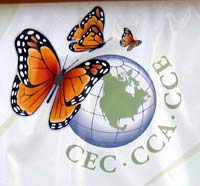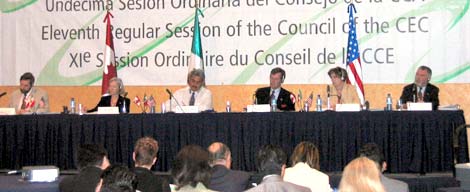MEXICO CITY – After a smooth day of air travel, I have finally arrived in Mexico City. I was relieved that as I passed through customs and immigration, the Spanish rolled off my tongue with relative ease. I made my way to the bus terminal headed for Puebla, a colonial city about two hours outside of Mexico City. Puebla will host the Committee on Environmental Cooperation (CEC) of NAFTA's 11th annual public review and planning session.
After visiting the ticket window to purchase my 130 peso (roughly $13) fare to Puebla, I grabbed my ticket and headed toward my bus only to discover that in my haste, I failed to request, and therefore to receive, my 70 pesos in change. Doubling back, I approached the ticket agent and requested my change; before I could finish my sentence he handed me a fistful of bills and coins. Walking away the second time, counting the pesos more carefully, I discovered that again, he short-changed me by 10 pesos! Out of principle alone, I returned to the window and requested my final 10 pesos, which he gave me without question. Can't blame the guy for trying, I guess. Or can you?
With that first adventure under my belt, I am currently winding my way through the busy streets of Mexico City (known here as Distrito Federal) on a distinctly comfortable bus. Complete with cushioned reclining seats, safety belts, snacks, juice and personal headphones for listening to a movie, it certainly is a far cry from the famed "chicken buses" of Guatemala and the overcrowded truck beds that are the main source of public transportation through most of Asia. The traffic of Mexico City is surprisingly light, so I am relaxing, enjoying the trip and looking forward to tomorrow when I will begin the first of three days as a participant in the CEC's public meetings.
 The CEC banner |
Since its creation, the CEC, led by 15 volunteers (five appointed from each of the three participating nations) has focused on the most urgent environmental issues related to free trade. Additionally, in that the CEC was born out of public outcry, the spirit of public participation has maintained an important role, at least rhetorically, in the CEC's functioning and agenda. This participation makes the CEC one of the most transparent international organizations operating today. Over the past 10 years, the CEC's actions have centered on issues such as industrial pollution, community environmental projects, migratory species, biodiversity conservation, hazardous waste disposal, and green certification for tradable goods and public health. Each of these topics address the opportunities and challenges that emerge as international collaborations, such as free trade agreements, shape environmental changes and regulation. The CEC's projects also reflect the positive and negative consequences of dealing with these issues through NAFTA, a body of rules that although it impacts the environment, was created to achieve economic — not environmental — goals.
In reviewing the conference materials as well as the list of 200 participants from the public (who range from academics, lawyers, and former CEC commission members to activists and government officials from all three countries), this looks like it is going to be a dynamic and enlightening meeting of minds. The conference will evaluate the progress and impact of the Commission after 10 years of NAFTA, look forward to its future direction and role in the North American trade system, and importantly, take on the difficult question of how environmental regulations and protections fit into the broader goals of an economically driven free trade model. Does the CEC work within the guidelines of NAFTA to incorporate environmental protection into the successes of the free trading system? Or, is the CEC a body that operates in conflict with the goals of NAFTA, acting largely as an environmental watchdog?
I'll file a detailed report of (with luck) the answers to these questions following the conference.
– Elizabeth






